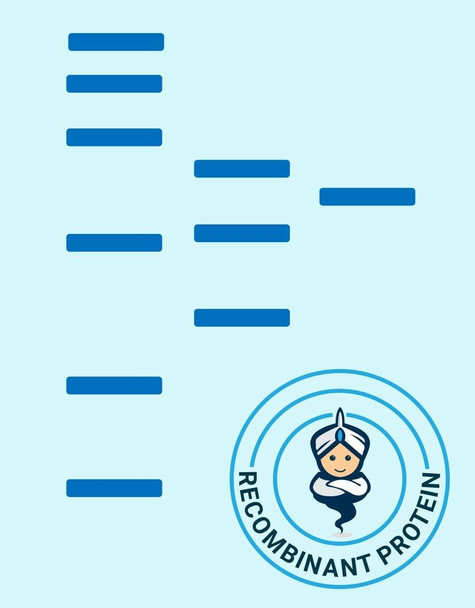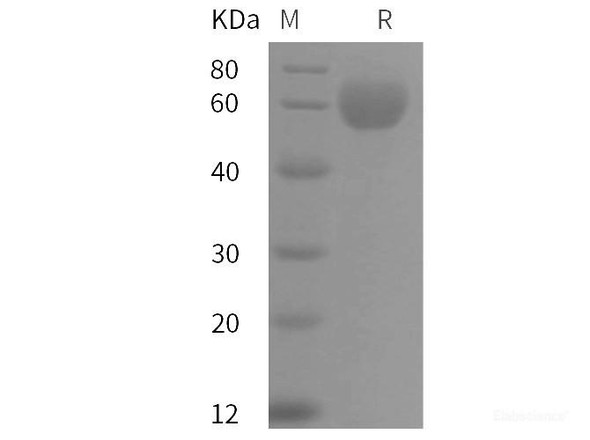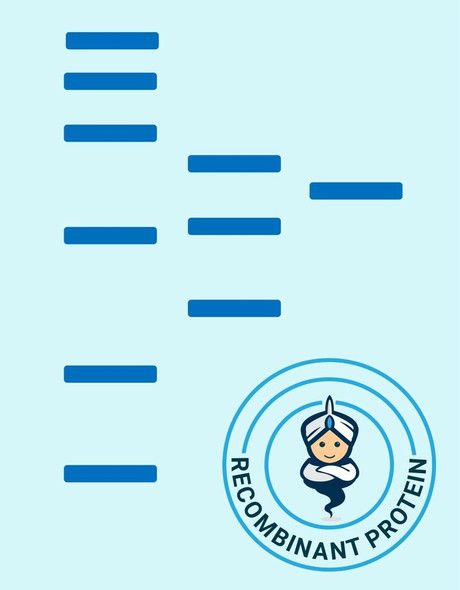Description
| Product Name: | Human APOH Recombinant Protein |
| Product Code: | RPPB2830 |
| Size: | 20µg |
| Species: | Human |
| Target: | APOH |
| Synonyms: | Beta-2-glycoprotein 1, Beta-2-glycoprotein I, Apolipoprotein H, Apo-H, B2GPI, Beta(2)GPI, Activated protein C-binding protein, APC inhibitor, Anticardiolipin cofactor, APOH, B2G1, BG, B2GP-1, B2 Glycoprotein-I. |
| Source: | Sf9 Insect cells |
| Physical Appearance: | Sterile Filtered clear solution. |
| Formulation: | APOH is supplied in 16mM HEPES buffer pH-7.2, 200mM NaCl and 20% glycerol. |
| Stability: | Store at 4°C if entire vial will be used within 2-4 weeks.�Store, frozen at -20°C for longer periods of time.�Avoid multiple freeze-thaw cycles. |
| Purity: | Greater than 95% as determined by SDS-PAGE. |
Apolipoprotein H (APOH) attaches to numerous kinds of negatively charged substances for instance heparin, phospholipids, and dextran sulfate. APOH prevents activation of the intrinsic blood coagulation cascade by attaching to phospholipids on the surface of damaged cells. APOH expressed by the liver and secreted in the plasma.
Apolipoprotein-H Human Recombinant produced in SF9 is a glycosylated, polypeptide chain containing 326 amino acids and having a molecular mass of 38,200 Dalton (excluding glycosylation), 45kDa total mass. APOH is expressed with a -6xHis tag and purified by proprietary chromatographic techniques.
| UniProt Protein Function: | APOH: Binds to various kinds of negatively charged substances such as heparin, phospholipids, and dextran sulfate. May prevent activation of the intrinsic blood coagulation cascade by binding to phospholipids on the surface of damaged cells. |
| UniProt Protein Details: | Protein type:Secreted; Lipid-binding; Secreted, signal peptide Chromosomal Location of Human Ortholog: 17q24.2 Cellular Component: extracellular matrix; extracellular space; chylomicron; cell surface Molecular Function:heparin binding; identical protein binding; protein binding; phospholipid binding; glycoprotein binding; lipid binding Biological Process: negative regulation of angiogenesis; negative regulation of myeloid cell apoptosis; triacylglycerol metabolic process; positive regulation of blood coagulation; negative regulation of fibrinolysis; negative regulation of endothelial cell proliferation; positive regulation of lipoprotein lipase activity; negative regulation of blood coagulation; triacylglycerol transport; blood coagulation, intrinsic pathway; plasminogen activation; regulation of fibrinolysis |
| NCBI Summary: | Apolipoprotein H has been implicated in a variety of physiologic pathways including lipoprotein metabolism, coagulation, and the production of antiphospholipid autoantibodies. APOH may be a required cofactor for anionic phospholipid binding by the antiphospholipid autoantibodies found in sera of many patients with lupus and primary antiphospholipid syndrome, but it does not seem to be required for the reactivity of antiphospholipid autoantibodies associated with infections. [provided by RefSeq, Jul 2008] |
| UniProt Code: | P02749 |
| NCBI GenInfo Identifier: | 543826 |
| NCBI Gene ID: | 350 |
| NCBI Accession: | P02749.3 |
| UniProt Secondary Accession: | P02749,Q9UCN7, B2R9M3, |
| UniProt Related Accession: | P02749 |
| Molecular Weight: | 345 |
| NCBI Full Name: | Beta-2-glycoprotein 1 |
| NCBI Synonym Full Names: | apolipoprotein H (beta-2-glycoprotein I) |
| NCBI Official Symbol: | APOH�� |
| NCBI Official Synonym Symbols: | BG; B2G1; B2GP1�� |
| NCBI Protein Information: | beta-2-glycoprotein 1; B2GPI; apo-H; beta(2)GPI; APC inhibitor; anticardiolipin cofactor; activated protein C-binding protein |
| UniProt Protein Name: | Beta-2-glycoprotein 1 |
| UniProt Synonym Protein Names: | APC inhibitor; Activated protein C-binding protein; Anticardiolipin cofactor; Apolipoprotein H; Apo-H; Beta-2-glycoprotein I; B2GPI; Beta(2)GPI |
| Protein Family: | Beta-2-glycoprotein |
| UniProt Gene Name: | APOH�� |
| UniProt Entry Name: | APOH_HUMAN |








